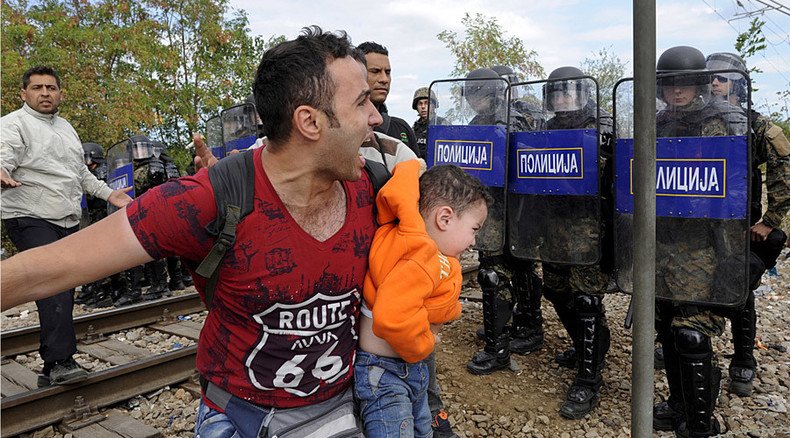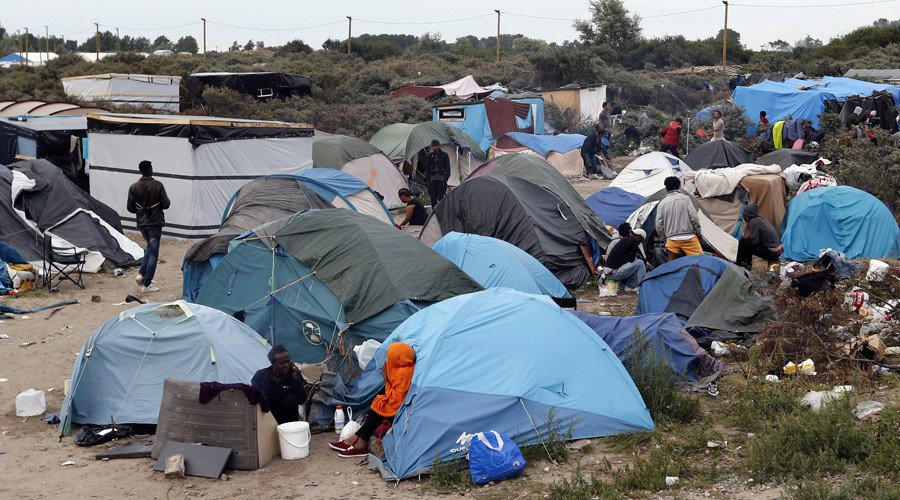‘EU should stop demonizing refugees’

The EU should think of a plan to integrate people who are fleeing from warzones to Europe, political analyst Chris Bambery told RT. These types of migrants are looking for the safest place which they consider to be Europe, he added.
Macedonian police have used tear gas and stun grenades against large crowds of migrants, who were trying to enter the country from Greece. A number of migrants were injured in clashes, including children.
RT: Has the migrant crisis reached the point of no return?
Chris Bambery: The migrant crisis is growing. I think ... the majority of these migrants are fleeing, firstly, war, as in the case of Syria, or indeed Afghanistan, and so on; or this growing conflict in central Africa. Secondly, there is the second biggest group of refugees after Syria; people are fleeing from the repressive regime in Eritrea, which isn’t talked about in the West, because it’s been a friend of the West.
READ MORE: Macedonian police teargas thousands of refugees crossing from Greece – reports
What we have here is these two basic transit routes: One through the central Mediterranean, through the Italian island of Lampedusa, which is much talked about and increasingly through Turkey trying to get into the EU. What is happening here is that the EU is attempting to fortify its borders. And in particular the richest countries of the EU - Germany, Britain and so on - are essentially keeping refugees of the Syrian conflict out - a conflict they helped create, I should add - and allowing these refugees to be dumped in countries in Eastern Europe, like Macedonia, Bulgaria, and so on, just as they have been dumped in Italy. That is creating the problems. What the issue here should be -is should the EU be working on a plan to take genuine refugees, as most of these people are, and settle them in countries like Germany and Britain, who’ve taken a pitiful number of refugees - probably in Britain less than a thousand.

RT: How can Europe help deal with the root of the problem which is the instability in those regions? Why has there been no clear proposal from Brussels to ease local migrant concerns?
CB: Because there is, of course as we’ve seen, in Sweden the rise of an anti-immigrant party, a racist party, that is happening elsewhere in Europe. Because of that, politicians across the EU are running scared of giving any commitments to taking any large number of refugees. What we really need is something like what happened after WWII when Europe faced a far bigger refugee crisis- much bigger than this. But different nations sat down and discussed this, planned it, and solved the issue. What we need here is joined up thinking where the EU nations come together and decide that we’re going to take in genuine refugees fleeing the conflict in Syria and work out quotas for each country, including Britain, for instance, that is always refusing to take any.
I think as well we need to change language about these people. I was talking to my local Church of England minister who told his congregation: “If you lived in Syria, you would flee with your children, because you want to get out of that situation, and the place you want to come to is the safest place in the world which is Europe, and the place with jobs, with prosperity which is Europe.”
So there is nothing wrong with what these people are doing - they are trying to do best for their children, best for their families. We should stop demonizing them, as I say we should be thinking of that plan to integrate these people. Secondly, we should also get into prospective, the vast majority of refugees from Syria aren’t coming to Europe, they are still in Lebanon, Turkey, Jordan, and elsewhere. And that problem again - Europe is not doing anything to address. So there is a big problem here which needs not just EU intervention, but UN’s help to deal with. And it shouldn’t be dumped in a country like Macedonia, or Bulgaria, which have huge social problems themselves.
RT: How can European countries come to a common agreement?
CB: That requires a sea change. We’re seeing Italy, for example, taking large numbers of these people. We are also seeing France blocking the border with Italy; we’re seeing Britain do the same at Calais; we’re seeing Germany do the same. So it is up to the countries in Northern Europe to address this issue and do far more. Germany in particular, but Britain, and Holland, [etc.] should be saying: “We’re going to up the number of refugees we’re going to take them from Syria. Britain in particular has a moral responsibility because it’s been arming and fueling the civil war in Syria. We should be doing far more than taking a paltry 1,000 refugees from Syria as a moral responsibility. There has to be some reckoning here. And the countries of Northern Europe do need to step up to the mark here and take the responsibility.
The statements, views and opinions expressed in this column are solely those of the author and do not necessarily represent those of RT.
LISTEN MORE:
The statements, views and opinions expressed in this column are solely those of the author and do not necessarily represent those of RT.












